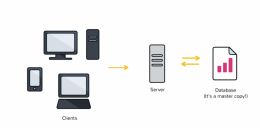Cryptocurrencies have been around for a while now, and they’re increasingly becoming of interest to tax liability regulators. But many of us are not clear as to how tax regulations are going to work. In this article, we are going to cover four facts that you must know.
Most people simply don’t think they need to pay taxes while using digital currencies, but the truth is that none of us are exempt from taxes as long as we trade assets, even if they are crypto-related.
To that end, the IRS (Internal Revenue Service) has stated that all virtual transactions related to digital currencies are subject to tax in accordance with the law. The agency has provided guidance about what principles should be applied toward the taxation of cryptocurrencies.
However, even though it’s been declared that cryptocurrencies are taxable under the law, it’s not clear what such taxation should look like. The Internal Revenue Service has determined that for tax purposes, cryptocurrencies shouldn’t be handled as a regular currency; instead, it should be considered an asset or perhaps a property.
Says attorney Sarah-Jane Morin:
Some people with bitcoin may think of it as dollars or cash… But for IRS purposes it should be treated as a house, stocks, bonds. You have to look at the general tax principles that apply to property and how it impacts your gains or losses.
Here are 4 facts you should take into account if you trade cryptocurrencies:
1. YOU ARE THE ONE ENTIRELY RESPONSIBLE FOR REPORTING
Tax researcher Janna Herron says that under normal circumstances, a brokerage company or bank entity will send you your 1099 tax form, but you won’t be receiving one for cryptocurrency.
Additionally, Coinbase will only issue a statement if you transacted $20,000 or more, and made at least 200 transactions. It’s your responsibility to determine your tax obligations and resolve them.
2. CRYPTOCURRENCIES ARE MORE LIKELY TO BE TREATED AS PROPERTY THAN AS CURRENCY
The IRS has determined that cryptoassets are not currencies, but rather, property. Therefore, your transactions will be handled as real estate or stocks, meaning you will only have to pay taxes if you attained gains, and can deduct from your taxes if you experienced any losses.
Moreover, you need to track your cost basis in order to determine your taxes accurately. For this, we recommend collecting information such as the date on which you bought each cryptoasset, the price you paid, the date you sold it, and how much you received for them.
Websites like Bitcoin.tax or Cointracking.info can be used for making this calculation easier, and also for getting some instructions on how to file Schedule D (Form 1040) correctly.
3. HIDING TRADES WILL ONLY HURT YOU
It is never a good idea to hide your trades from the Internal Revenue Service. Even if you don’t inform them of your transactions, they may discover them later and, of course, apply penalties under the law.
Even though regulations are off the table for now, the agency may still apply some penalties if it’s considered necessary.
Morin, the attorney, explains, “The best way to avoid penalties is to do the best you can with the reporting. That will show that you didn’t have a willful intent to avoid taxes.”
Some of the penalties include prison for a term of up to 5 years, and a fine of up to $250,000.
4. REGISTER EVERY TRANSACTION YOU MAKE
Every time you make a trade with cryptocurrencies, remember to log it, as you don’t want to be worried later about looking for receipts and emails in order to get valuable information related to your activities.
Regarding this, Morin states, “Going forward, it would probably be easier to keep detailed records of what you bought and when you bought it.” In the meantime, though, to be in charge is the only option.
Moreover, every time you make a taxable trade, it is essential that you set aside some money. Nobody will remind you of that, but if you do it, besides being completely responsible for your taxes, you will also have an enjoyable tax experience.











